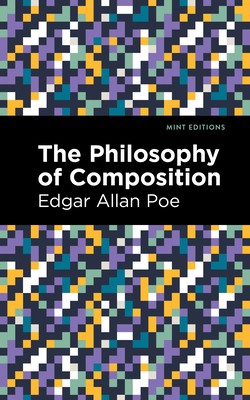
- Išsiųsime per 12–18 d.d.
- Autorius: Edgar Allan Poe
- Leidėjas: Mint Editions
- ISBN-10: 1513291777
- ISBN-13: 9781513291772
- Formatas: 12.7 x 20.3 x 0.2 cm, minkšti viršeliai
- Kalba: Anglų
- Extra -15 % nuolaida šiai knygai su kodu: ENG15
Atsiliepimai
Aprašymas
The Philosophy of Composition (1846) is an essay by Edgar Allan Poe. Recognized as a foundational figure of nineteenth century fiction, Poe has inspired generations of readers and writers with his craftsmanship and taste for tragedy and terror. His brief but meteoric career shaped the trajectory of American literature forever, forming a legacy without which science fiction, horror, and detective writing would surely be shells of themselves. Published only three years before his untimely death, the essay appeared in an April 1846 issue of Graham's American Monthly Magazine of Literature and Art, whose editor had previously made the mistake of turning down "The Raven." Both influential and controversial, Poe's essay on craft was intended as a dismissal of the myth of spontaneous art, arguing instead that a true artist depends upon attention to detail and adherence to a logical creative process. Using his own poetic masterpiece as an example, Poe claims that the writer must maintain "unity of effect" throughout the work in order to inspire the intended emotional response in the reader. Once this element has been set in place, the writer may proceed with the more technical aspects of composition, such as characters, setting, and plot. Although Poe's essay drew the ire of Anglo-American poet T. S. Eliot, it was immensely popular among Poe's Francophone audience and served as inspiration for such artists as Maurice Ravel and Charles Baudelaire. With a beautifully designed cover and professionally typeset manuscript, this edition of Edgar Allan Poe's The Philosophy of Composition is a classic of American literature reimagined for modern readers.
EXTRA 15 % nuolaida su kodu: ENG15
Akcija baigiasi už 1d.14:26:31
Nuolaidos kodas galioja perkant nuo 5 €. Nuolaidos nesumuojamos.

- Autorius: Edgar Allan Poe
- Leidėjas: Mint Editions
- ISBN-10: 1513291777
- ISBN-13: 9781513291772
- Formatas: 12.7 x 20.3 x 0.2 cm, minkšti viršeliai
- Kalba: Anglų
The Philosophy of Composition (1846) is an essay by Edgar Allan Poe. Recognized as a foundational figure of nineteenth century fiction, Poe has inspired generations of readers and writers with his craftsmanship and taste for tragedy and terror. His brief but meteoric career shaped the trajectory of American literature forever, forming a legacy without which science fiction, horror, and detective writing would surely be shells of themselves. Published only three years before his untimely death, the essay appeared in an April 1846 issue of Graham's American Monthly Magazine of Literature and Art, whose editor had previously made the mistake of turning down "The Raven." Both influential and controversial, Poe's essay on craft was intended as a dismissal of the myth of spontaneous art, arguing instead that a true artist depends upon attention to detail and adherence to a logical creative process. Using his own poetic masterpiece as an example, Poe claims that the writer must maintain "unity of effect" throughout the work in order to inspire the intended emotional response in the reader. Once this element has been set in place, the writer may proceed with the more technical aspects of composition, such as characters, setting, and plot. Although Poe's essay drew the ire of Anglo-American poet T. S. Eliot, it was immensely popular among Poe's Francophone audience and served as inspiration for such artists as Maurice Ravel and Charles Baudelaire. With a beautifully designed cover and professionally typeset manuscript, this edition of Edgar Allan Poe's The Philosophy of Composition is a classic of American literature reimagined for modern readers.




Atsiliepimai